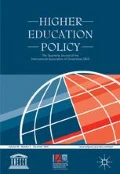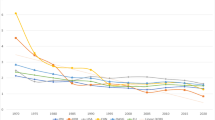Since the twenty-first century, transnational education (TNE) has been closely related to the concept of capacity building. Although empirical evidence of the impact of TNE on capacity building in host countries is largely missing, a handful of studies have revealed that TNE has a limited impact on local higher education. This study attempts to discover reasons for this limited impact, finding that TNE’s academic weakness and isolation from local faculties and programmes impede knowledge transfer and organizational learning. As a result, TNE is at the edge of the local higher education system and exerts a marginal impact on host countries’ capacity building. To prevent TNE from being ‘a mere imported capacity with no impact on the local system’ (OECD and the World Bank in Cross-border tertiary education: a way towards capacity development. OECD, Paris, 2007, 12), TNE urgently needs to establish its own brand instead of living on partner universities’ brand effect. Moreover, communication between TNE and local higher education needs to be facilitated.
Similar content being viewed by others
References
Azman, N., Sirat, M. and Ahmad, A.R. (2014) ‘Higher education, learning regions and the Malaysian transformation policies,’ Higher Education Policy 27(3): 301–321.
British Council (2013) The shape of things to come: the evolution of transnational education: data, definitions, opportunities and impacts analysis, Manchester: British Council. Available on https://www.britishcouncil.org/sites/default/files/the_shape_of_things_to_come_2.pdf.
British Council. (2014) Exploring the impacts of transnational education on host countries: a pilot study, Manchester: British Council. Available on https://www.britishcouncil.org/sites/default/files/tne_report_2014.pdf.
British Council and DAAD (2014) Impacts of transnational education on host countries: academic, cultural, economic and skills impacts and implications of programme and provider mobility, Manchester: British Council. Available on https://www.daad.de/medien/hochschulen/projekte/studienangebote/2014_e003_tne_study_final_web.pdf.
Chan, D. and Ng, P.T. (2008) ‘Similar agendas, diverse strategies: the quest for a regional hub of higher education in Hong Kong and Singapore’, Higher Education Policy 21(4): 487–503.
Chiang, L. (2012) ‘Trading on the west’s strength: the dilemmas of transnational higher education in East Asia’, Higher Education Policy 25(2): 171–189.
Coase, R.H. and Wang, N. (2013) Transform China: The Chinese Approach to Market Economy, Beijing: Zhongxing Publisher (in Chinese).
Debowski, S. (2003) Lost in internationalised space: the challenge of sustaining academics teaching offshore, AIEC-IDP, http://aiec.idp.com/uploads/pdf/DebowskiFri0900_p.pdf, last accessed 5 March 2018.
Ding, X. (2017) ‘Capacity building or market demand? Transnational teaching in China’, Higher Education Policy. https://doi.org/10.1057/s41307-017-0053-9.
Dong, X. (2007) ‘Capacity building in cross-border education and issues in Sino-foreign cooperation in education provision’, Tsinghua Journal of Education 28(5): 46–52 (in Chinese).
Gu, M. (2008) ‘Sino - foreign school running cooperation’, Education Science 24(6): 27–32 (in Chinese).
Knight, J. and Morshidi, S. (2011) ‘The complexities and challenges of regional education hubs: focus on Malaysia’, Higher Education 62(5): 593–606.
Lane, J.E. and Kinser, K. (2011) ‘The cross-border education policy context: educational hubs, trade liberalization, and national sovereignty’, New Directions for Higher Education 155: 79–85.
Li, X. (2011) ‘A study on Chinese-foreign cooperation of school running in the perspective of higher education institutional transformation’, Educational Research 10: 54–58 (in Chinese).
Liu, M. (2013). ‘The implication of the Chinese University of Hongkong, Shenzhen to transnational education in China’, Jiangsu Higher Education 4: 53–55 (in Chinese).
Ministry of Education (2013) ‘Notice of Issuing the Evaluation Scheme of Sino-foreign Cooperation in Education’, http://wsb.njxzc.edu.cn/69/5f/c3615a26975/page.htm (in Chinese).
Mok, K.H. (2008) ‘Singapore’s global education hub ambitions: University governance change and transnational higher education’, International Journal of Educational Management 22(6): 527–546.
OECD and the World Bank. (2007) Cross-border Tertiary Education: A Way towards Capacity Development, Paris: OECD, http://documents.worldbank.org/curated/en/130291468150286706/pdf/413320REVISED00r0Tertiary0Education.pdf.
Pfotenhauer, S.M., Jacobs, J.S., Pertuze, J.A., Newman, D.J. and Roos, D.T. (2013) ‘Seeding change through international university partnerships: the MIT-Portugal programme as a driver of internationalization, networking, and innovation’, Higher Education Policy 26(2): 217–242.
Quality Assurance Agency for Higher Education (2010) UK collaboration in Malaysia: institutional case studies: University of Nottingham Malaysia Campus, Gloucester: QAA, available on http://www.qaa.ac.uk/en/Publications/Documents/University-of-Nottingham-Malaysia-Campus-AOP-ICS-10.pdf.
Shanghai Municipal Education Commission (2015) Shanghai initiates comprehensive education reforms, http://www.shmec.gov.cn/html/article/201503/79993.php (in Chinese).
Sheng, J. (2014) ‘Chinese-foreign cooperation in running schools: achievements and prospect’, Research in Educational Development (1): 3 (in Chinese).
Sidhu, R., Ho, K.C. and Yeoh, B. (2011) ‘Emerging education hubs: the case of Singapore’, Higher Education 61(1): 23–40.
Tan, Z. (2010) ‘A historical review of policies on Sino-foreign cooperative education’, Journal of Zehnzhou University 43(4): 167–170 (in Chinese).
Tierney, W.G. and Lanford, M. (2015) ‘An investigation of the impact of international branch campuses on organizational culture’, Higher Education 70(2): 283–298.
Vincent-Lancrin, S. (2007) ‘Developing capacity through cross-border tertiary education,’ in OECD and The World Bank (eds.) Cross-border tertiary education: A way towards capacity development, Paris: OECD, pp. 47–108, available on http://documents.worldbank.org/curated/en/130291468150286706/pdf/413320REVISED00r0Tertiary0Education.pdf.
Vincent-Lancrin, S. (2009) ‘Cross-border higher education: Trends and perspectives’, in OECD (eds.) Higher Education to 2030: Globalization, Paris: OECD, pp. 63–88.
Xue, W. (2015) ‘On the quality of Chinese-foreign cooperation in running schools’, China Higher Education Research 10: 22–25 (in Chinese).
Yang, H. (2003) ‘Market supply and Sino-foreign cooperative education’, Education Science 12: 52–55 (in Chinese).
Zhang, S. (2014) ‘On the effects of Chinese-foreign cooperation in school running in local high-level university’, Journal of Hebei University (Philosophy and Social Science) 39(2): 62–66 (in Chinese).
Acknowledgements
Funding was provided by The Humanities and Social Sciences Foundation of the Chinese Ministry of Education (14YJA880014).
Author information
Authors and Affiliations
Corresponding author
Rights and permissions
About this article
Cite this article
Ding, X. Marginal Revolution: The Impact of Transnational Education on Higher Education in Host Countries: A Case Study of China. High Educ Policy 32, 419–440 (2019). https://doi.org/10.1057/s41307-018-0089-5
Published:
Issue Date:
DOI: https://doi.org/10.1057/s41307-018-0089-5




